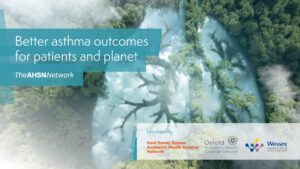How tackling climate change benefits respiratory care
On Clean Air Day (15 June 2023) three Academic Health Science Networks (AHSNs) are launching a toolkit for respiratory professionals to help cut the carbon footprint of inhalers, optimise prescribing and identify severe asthma. Amelia James (pictured), Environmental Sustainability Lead at the Kent Surrey Sussex (KSS) and Oxford AHSNs, explains the thinking behind the ‘Better asthma outcomes for patients and planet’ initiative.
Climate change affects everyone, but people living with respiratory conditions are at greater risk. An increase in air pollution linked to rising temperatures is leading to smog becoming a more common phenomenon, irritating the lungs of many people and triggering severe asthma attacks. Ella Kissi-Debrah who died a decade ago was the first person to have air pollution listed as their cause of death. This month wildfires in Canada have caused unprecedented levels of smog and poor air quality, reminding us how far we still have to go to address air pollution and ease pressure on respiratory care.
Respiratory care itself has an impact on the environment. When the NHS became the world’s first health system to set ‘net zero’ targets ‘ in 2020[1], one of the focus areas was the use of inhalers. Inhaler emissions account for approximately 3% of the NHS’s carbon footprint (and as high as 13% in primary care). The propellant used in metered dose inhalers (MDIs) accounts for most of this. Yet greener alternative inhalers are available, such as dry powder inhalers (DPIs). Changing clinical practices for a condition as common as asthma is not easy – but it provides the NHS has an opportunity to not only improve the quality of care for individual patients but also to demonstrate responsible stewardship of the environment.
 I am delighted that KSS, Oxford and Wessex AHSNs have come together to create a toolkit called ‘Better asthma outcomes for patients and planet‘. We hope it will become the ‘go to guide’ for healthcare professionals working in the respiratory field. It contains helpful information on reducing the carbon footprint of inhalers, optimising effective inhaler prescribing, identifying severe asthma and more.[2] By empowering clinicians with knowledge of the environmental impact of asthma treatments they are better armed to transform prescribing practices to benefit the entire planet as well as individual patients.
I am delighted that KSS, Oxford and Wessex AHSNs have come together to create a toolkit called ‘Better asthma outcomes for patients and planet‘. We hope it will become the ‘go to guide’ for healthcare professionals working in the respiratory field. It contains helpful information on reducing the carbon footprint of inhalers, optimising effective inhaler prescribing, identifying severe asthma and more.[2] By empowering clinicians with knowledge of the environmental impact of asthma treatments they are better armed to transform prescribing practices to benefit the entire planet as well as individual patients.
The climate crisis is a health crisis. We can take positive steps today to reduce the NHS’s carbon emissions – these account for around 5% of the UK’s total emissions – which will have a lasting impact on the health of populations.
AHSNs offer a range of support in this field – contact me or find your local AHSN here
[1] The NHS has set two net zero targets. For emissions the NHS controls directly, their target is 2040. For emissions the NHS can only influence, but not control, their target is 2045.
[2] The resources identified in this document are some of the options available to support respiratory professionals. Other resources may also be available; this list is not exhaustive.


